

Built Environment. Communities. Immersive Technologies. Machine/Human Interface. Mobility. Collaborative Telepresence Could Render Distance (Relatively) Meaningless. Decentralized Microgridding Can Provide 90% of a Neighborhood's Energy Needs, Study Finds. A new report funded by the Dutch government finds that microgrid technologies could make a local “techno-economy” 90 percent self-sufficient, through the decentralised sharing of energy at the local level between multiple households.

The new approach could even pave the way for “100 percent self-sufficiency in power, heat, and water, and 50 percent self-sufficiency in food production”, according to the report’s author, energy systems engineer Florijn de Graaf. If optimized properly, microgrids could play a pivotal role in supporting efforts to transition to renewable energy systems and meet climate targets, finds the report published by Netherlands-based energy systems company Metabolic. The report was funded by the Dutch Ministry of Economic Affairs and the Netherlands Enterprise Agency.
Under the Paris Agreement, the Dutch government has pledged to drop its carbon dioxide emissions by 80-95 percent by 2050. From SIDE systems presentation. WeChat’s Novel Data Policy Drives Creativity and Creates the Ubiquitous App. How Close Are We to Building a Quantum Computer? The race is on to build the world’s first meaningful quantum computer—one that can deliver the technology’s long-promised ability to help scientists do things like develop miraculous new materials, encrypt data with near-perfect security and accurately predict how Earth’s climate will change.
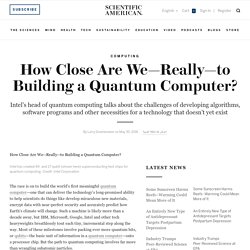
Such a machine is likely more than a decade away, but IBM, Microsoft, Google, Intel and other tech heavyweights breathlessly tout each tiny, incremental step along the way. Most of these milestones involve packing ever more quantum bits, or qubits—the basic unit of information in a quantum computer—onto a processor chip. But the path to quantum computing involves far more than wrangling subatomic particles. New Laser Could Improve Telecoms & Computing. Researchers at the University of California San Diego have demonstrated the world's first laser based on an unconventional wave physics phenomenon called bound states in the continuum.
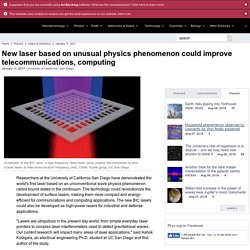
The technology could revolutionize the development of surface lasers, making them more compact and energy-efficient for communications and computing applications. The new BIC lasers could also be developed as high-power lasers for industrial and defense applications. "Lasers are ubiquitous in the present day world, from simple everyday laser pointers to complex laser interferometers used to detect gravitational waves. Wildcard: A Closed Internet. The robot will see you now: could computers take over medicine entirely?
Like all everyday miracles of technology, the longer you watch a robot perform surgery on a human being, the more it begins to look like an inevitable natural wonder.
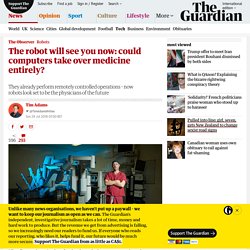
Earlier this month I was in an operating theatre at University College Hospital in central London watching a 59-year-old man from Potters Bar having his cancerous prostate gland removed by the four dexterous metal arms of an American-made machine, in what is likely a glimpse of the future of most surgical procedures.
Australians Turn to Micro-Grids for Energy. The Economics of Happiness (abridged) Healthcare Is Coming Home With Sensors & Algorithms. Anna could not figure out what is wrong with her: in spite of being generally healthy, she has been sweating during sleep for days, she had lost some weight although she gave up her diet a while ago and she has been feeling mortifyingly tired for a while.
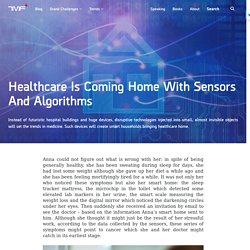
It was not only her who noticed these symptoms but also her smart home: the sleep tracker mattress, the microchip in the toilet which detected some elevated lab markers in her urine, the smart scale measuring the weight loss and the digital mirror which noticed the darkening circles under her eyes. Then suddenly she received an invitation by email to see the doctor – based on the information Anna’s smart home sent to him. Although she thought it might just be the result of her stressful work, according to the data collected by the sensors, these series of symptoms might point to cancer which she and her doctor might catch in its earliest stage. Certain elements of the “health internet of things” already exist. Trust: Why Self-Driving Cars Need it Just as Much as We Do. Self-driving vehicles will not only need to “see” the world, they’ll need to communicate and work together.
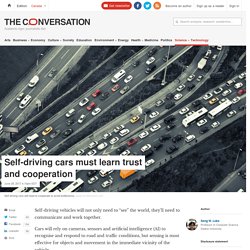
Cars will rely on cameras, sensors and artificial intelligence (AI) to recognise and respond to road and traffic conditions, but sensing is most effective for objects and movement in the immediate vicinity of the vehicle. Not everything important in a car’s environment will be caught by the vehicle’s camera. Mobile Payments Completely Replacing Cash in World’s Largest Nations. In Brief China's urban centers are rapidly becoming cash-free zones as digital payment methods take over.

This cashless revolution is part of the "green finance" program in some areas, and it is saving the country money and resources. The Future of Money China is quickly transitioning away from paper currency, with nearly everyone in major urban centers using smartphones to pay for almost everything. US Police Body Cams Soon to use AI to Find Missing People. India's Digitising Everything From Cash to Citizen Identification. In Brief India has made the largest changes in identification and monetization that the country — and most of the world — has ever seen by introducing a nationwide ID database and largely eliminating physical currency.

This has the potential to transform the rest of the world as well. Cash Bans and Digital Plans. Technology That Makes It Impossible for You to Believe What You See. Virtual Reality to Take Over Your Social Life. The door to mass-market virtual reality is about to burst open.

Engineers have solved most of the hardware challenges, driven down the price to just a few hundred dollars, done extensive testing, and gotten software tools into the hands of creative developers. Store shelves will soon be teeming with head-mounted displays and hand controllers that can paint dazzling virtual worlds. How the Robot Revolution will Change how we See, Feel, & Talk. The War on the Disturbingly Real VR Trolls. I felt awkward when Katie Kelly, a slim woman in a turquoise sweater, stepped closer.

Despite the crackling campfire, this was a professional meeting, and she had intruded on my personal space. “Around here it starts to feel a little bit too uncomfortable,” said Kelly, looking up at the white humanoid robot that was my own body. Kelly was gently demonstrating why she and others at social virtual-reality startup AltSpaceVR have been working on ways to give people more control of their virtual personal space. Industry leaders such as Facebook’s Mark Zuckerberg say that virtual reality must become a place we can socialize if the medium is to become widely popular. An AI Ally to Combat Bullying in Virtual Worlds. In any fictionalized universe, the distinction between playful antagonism and earnest harassment can be difficult to discern. Name-calling between friends playing a video game together is often a form of camaraderie. Between strangers, however, similar words assume a different, more troublesome quality.
1st Direct Counterfactual Quantum Comms Achieved. The Mixed Reality Revolution is here, and it’ll change your world forever. The past 30 years have set the stage for technological and cultural change at an unprecedented scale. Death Technology Allows the Living to Speak to Deceased. Imagine you have a close friend you frequently communicate with via text. The Future is Now…& it's Called Sarah! What if the internet stopped working for a day? How AI & HI Are Combined Will Define Humanity’s Future. Through the past few decades of summer blockbuster movies and Silicon Valley products, artificial intelligence (AI) has become increasingly familiar and sexy, and imbued with a perversely dystopian allure.
Are Chatbots the Future of Banking (...& Customer Service)? VR Project Lets Users See Life as a Doomed Cow or Piece of Coral. Reusable Takeaway Smart Cup is Arrives in Melbourne Cafes. Rise of the Robots. Long Short Term Memory & the Future of AI. Amazon & the CIA Want to Teach AI to Watch from Space. Why can’t computers watch the Earth from above and automatically map our roads, buildings, and trash heaps? The Artificial Intelligence Revolution: Part 2. Ahimsa Online — The Message.